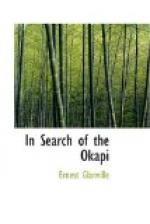“It’s your bag,” said Compton. “To think that we stood shivering and shaking for two mortal hours, while all the time the beggar was helpless!”
Venning did not echo the complaint; he was too much occupied examining his prize, and taking exact measurements with a tape, which he entered in his log’ book, together with a description of the markings.
“It’s a new species,” he said, with the pride of an explorer who discovers a new mountain. “I will call it a tree-lion—leo arboriensis Venningii—that is, if you don’t wish it called after you.”
“Call it anything you like, old fellow; but I should say it was just an ordinary leopard.”
“You never saw a leopard with those markings.”
“And no one ever saw a climbing lion.”
“It has adapted itself to changed conditions. The markings match the colouring of the branches, and there has been a change in the formation of the claws”—holding up a huge paw—“while the forearm is a little curved, and the skin between the elbow and the body bears a resemblance in its growth to that found on the so-called ‘flying-squirrel.’”
“It’s a tough customer, whatever it is, and I hope that it is the last of its kind. Do you know that we have no more water?”
“I shall examine the contents of the stomach, and I fully expect to find that its usual prey is the monkey.”
“It had a great hankering for white man, at any rate. Did you hear me say there was no water?”
“Its hind legs are very much longer than the fore legs—another proof of an arboreal existence. It’s a most important find. I wish Mr. Hume were here.”
“So do I,” said Compton, heartily, stirring the jackal with his foot.
That sagacious animal rose slowly, stretched itself, one leg at a time, sniffed at the dead leopard, or tree-lion, whatever it was, and then curled itself up again.
“Coo-ee—coo-ee!” came out of the woods.
“Coo-ee!” replied Compton, to the glad sound. “Coo-ee!” and he fired off his gun.
Muata’s shrill whistle pierced through the files of trees, and the jackal slunk away.
“Hurrah!” yelled Compton, taking off his cap. “Hurrah! Here we are— all safe!”
“All safe, thank God;” and Mr. Hume hurried forward, with his eyes beaming. “Thank God.”
“It is as I thought. Here is the hind leg of a monkey, with some of the hair still attached;” and Venning held up a disgusting-looking object.
Mr. Hume looked at the dead animal, the broken hut, and back at Compton.




